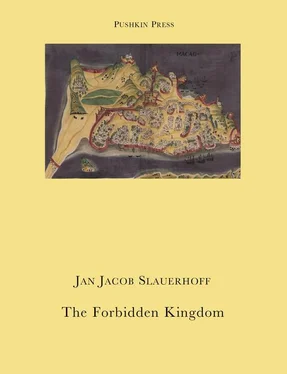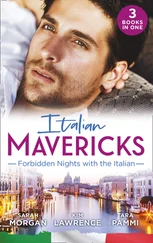Jan Jacob Slauerhoff
The Forbidden Kingdom
For Albino Forjaz de Sampaio
IN SEPTEMBER 1540, when the settlement of Lian Po had been in existence for almost eighteen years, an imperial delegation arrived at the North Gate, bearing the celestial name on its banner, but bringing no goodwill gifts and dressed in light-blue mourning robes. The head of the delegation requested an audience with the governor, Antonio Farria. As it was night-time, they were conducted through the city to an inn by the light of torches and lanterns and despite their impatient grumbling were not taken to see Farria until the following morning; instructed of their arrival and apparel, he awaited them seated on a throne, in armour.
The oldest member of the group stepped forward, without removing his skull cap, and said in measured tones: “Lian Po will be laid waste, the Portuguese and their slaves will be tortured till they curse the day they were born, if their brethren in the south continue their conquest of Malacca.”
Farria, without raising either his voice or his body, took a roll of parchment from the table next to him, unfolded a map of Malacca, indicated a red line that cut off the neck of the peninsula and pointed through the window to the river where the ships were raising ensigns and unfurling their standards. Then he gave a signal, a shot was fired and was answered by many blazing barrels, and rejoicing erupted across the city and the river. The envoys returned home through a celebrating city in closed litters.
At the end of the year an imperial fleet of well over a thousand sails appeared in the harbour mouth. That was one ship for every Portuguese in Lian Po. Spies reported the advance of a great army, three days’ march away. Farria left Lian Po under the command of Perez Alvadra and with the thirty ships at anchor in the harbour hurled himself at the junks. He had ordered a fortress cannon and a long-barrelled gun to be mounted on six of his vessels, and these now fired among the junks, as his fleet drifted slowly towards the enemy. Before contact was made, hundreds had sunk. Then an offshore wind suddenly got up, the heavy artillery was dumped overboard and with swift manoeuvres the Portuguese carvelas cut through the enemy, firing in all directions. But eventually scores of junks had attached themselves to each ship and hundreds of warriors with their blood-curdling cries had leapt on deck, cutlasses slashing. Grenades from the crow’s nests, musket fire from poop deck and stern, knives and lances on the decks exterminated the Manchus like swarms of locusts.
At night the battle continued by torchlight, armed sloops joined in the fray, and swarms of sharks, the hyenas of sea battles, fought over the bloody casualties as they drowned.
The torches were burning low when there was a great glow from the land. A broad red wall of slow-burning flames rose from horizon to horizon. Seeing this, Farria was beside himself with fury and signalled to his ships to assemble for a final assault. Nine clustered alongside his vessel; the others could not disengage themselves from the tangle or had been overrun.
Three times in quick succession, continuously firing and ramming whatever crossed their bows, they carved a path through the Chinese fleet. The dawn, breaking through on the horizon, lit up the fleeing junks and four tall ships turned away from them and headed back to the bay. But Lian Po had already disappeared, and a thick pall hung over silent piles of rubble from collapsed walls and charred beams.
Farria went to where his city had stood. The streets were almost buried under the fallen masonry, but he found a way through, spearing bodies and tossing them aside with his sword if they obstructed him, and finally stood in front of the ruins of his own house. He did not dare step over the threshold. Beyond, his wife and children lay burnt or… He rested on his sword and waited until a couple of soldiers approached. “Search,” he ordered hoarsely, “clear the beams away, open the cellar.”
He was now sitting on a stone bench that had once been set among flowers and shrubs facing a small pool. He scooped some water from the pool and cooled his head. His hair was covered in charcoal and soot, but he did not notice. A few blackened swords and an iron pitcher were laid at his feet: all that was still recognizable. Farria himself went into his gutted house, and took away a few handfuls of ash in his handkerchief.
That evening four ships, all that was left of the first settlement in Cathay, sailed south in close formation.
The little fleet was ringed by the stars, with the moon above them in the black sky. On the poop deck of the Mãe de Deus stood Farria and Mendez de Pinto. They gazed at the sails, at the wake, occasionally walked the deck from side to side, and stopped in silence again.
A lamp was burning over the hatchway, and the copper of the hatch and the bronze of the cannon gleamed, while everything else was shrouded in darkness; darkness surrounded both the two lonely men and the sails. But gradually the dark hull began to glow in a green twilight, which first revealed the topsails, then dredged the bow up from the night, where a faint mumbling rose, like that of men waking.
Finally Farria’s large figure and the small, frail Mendez were also lit up. “Green is the colour of hope,” said Farria without conviction, but Mendez disagreed. “It’s St Elmo’s Fire — it heralds doom and death. What else can it mean?” And suddenly a flood of words poured from the lips of the taciturn officer, who for days had not uttered a syllable and had done nothing except run from side to side, testing cannon, drinking — drinking heavily — and cursing silently at the railing.
At last he found a channel for his resentment.
“All for nothing. Twenty years of struggle, loneliness, negotiations with yellow villains, patience, pleas for ammunition, troops.
“The supercilious letters from the usurers in Malacca, the haughty administrators in Goa, who ask why we’re venturing so far when the spices that yield most profit await loading in Malacca. The aggrieved letters of the prelates asking when Cathay will finally be converted. Those of the King wanting to know why his embassy was not better received in Beijing, and why it did not bring back more gifts.
“All they want is to hold on to what they have, buy off their enemies and laze about on their country estates.
“On the brink of the most fabulous riches, constant skirmishes with the most cunning and cruellest devils in an indefensible post on which we have wasted our lives. We’re now reaping the reward of fools, our wives have been tortured to death, our children burnt alive or abducted.
“We’re as penniless as we were thirty years ago, when we sailed out of the Tagus as poor noblemen, happy with the blessing of a cardinal and a knighthood from the King.
“What awaits us when we return? Anathema for having become heretics, the displeasure of the King, prison perhaps. Think of Columbus, think of Da Gama, of so many.
“Where are we to turn? What we built up lasted for twenty years and burned down in a single night. Let’s go to some island no one wants, and wait for death. Or let’s lie in wait for everything flying the Portuguese flag and destroy it. No, we’d do better to undertake the journey back. Let’s bombard Malacca and Goa and Lisbon for all we’re worth. Why were we born and why did we set forth in the first place?”
His features were ashen in the green light, his hands broke off pieces of wood and his body leant twitching against the railing. Until Farria, in the slow, measured tones he always used, tried to persuade his second-in-command to adopt his point of view.
Читать дальше












